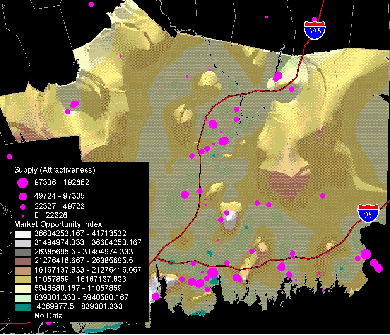|
It's a big world let's not search all of it. We can save you
time and money.
- Use just demand data to find areas that have sufficient
demand. This methodology does not account for the supply side of the equation, but is
useful for market ranking.
Calculate only demand and identify areas that could support a project if there
were no competition. Then research competitors in those select areas and do a "Large
Geography Demand Allocation" analysis of the balance of supply and demand to find
holes in the market or areas with the greatest feasibility potential. We program
algorithms that are unique to the product of our client and the output is a map showing
results of the balance of supply and demand throughout the studied area. The results can
be calculated as the
size of facility that can be supported, the feasibility potential
relative to other places on the map, probability
of securing a tenant, sales forecasts or staffing recommendations. These
maps provide answers to the questions you would ask if presented with maps showing demand
as colored polygons and competitors as dots. We do the "Map-Math" to provide
answers for you. We are presently capable of offering these services throughout the US.
- After specific sites are identified, a site specific analysis must be done. The
Site-Specific analysis will make use of detailed competitor research and real estate
considerations (access, travel patters, signage, layout, bridges, socio-economic divides,
etc.
If your marketing department or tenant has already developed some general
criteria, we can quickly find those areas that meet those criteria so site selection can
proceed with confidence that marketing will find sufficient demand. See Treasure Maps
The "Moonscape" below shows residual demand after accounting for the presence of
the competition. The "craters" show
areas trending toward oversupply and the ridges and peaks show areas
trending toward undersupply. This analysis is useful for finding
underserved infill locations.
|
|




